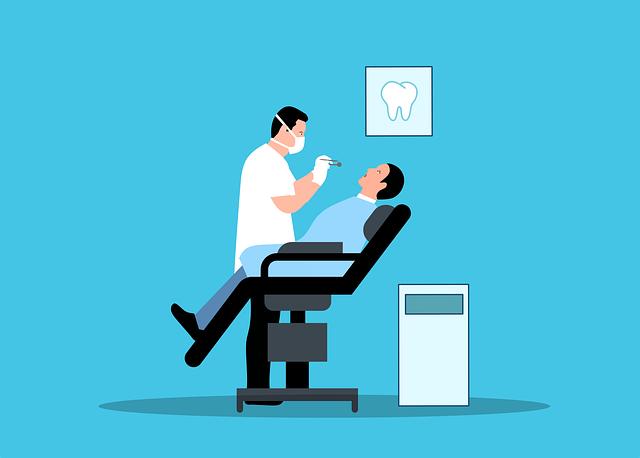Are you losing sleep because of GERD and teeth grinding? Discover the surprising link between these two conditions in this eye-opening article!
1. Understanding the Connection: GERD and Bruxism
GERD, or gastroesophageal reflux disease, is a condition where stomach acid flows back up into the esophagus. This can cause symptoms such as heartburn, chest pain, and acid regurgitation. On the other hand, bruxism is the habitual clenching or grinding of teeth, often during sleep. While these two conditions may seem unrelated, there is actually a connection between them that is worth exploring.
One possible link between GERD and bruxism is that the acid reflux associated with GERD can lead to tooth erosion. When stomach acid comes into contact with the teeth, it can wear down the enamel and make them more susceptible to damage from grinding. Additionally, the discomfort caused by GERD symptoms such as heartburn may exacerbate bruxism by triggering stress-related teeth grinding. It is important to be aware of this connection as addressing GERD symptoms may help alleviate bruxism and vice versa.
Managing both GERD and bruxism may involve lifestyle changes such as avoiding trigger foods for acid reflux and practicing relaxation techniques to reduce stress. Additionally, seeking treatment from healthcare professionals such as dentists and gastroenterologists can help in developing a comprehensive plan to address both conditions effectively. By understanding the connection between GERD and bruxism, individuals can take proactive steps to improve their oral health and overall well-being.
2. GERD’s Impact on Oral Health: The Link to Bruxism
GERD, or Gastroesophageal Reflux Disease, can have a significant impact on oral health, particularly in relation to bruxism. Bruxism is a condition characterized by excessive teeth grinding or jaw clenching, which can lead to various dental problems. Research has shown a strong correlation between GERD and bruxism, with GERD exacerbating the symptoms and effects of bruxism.
Individuals with GERD often experience acid reflux, which can cause erosion of tooth enamel and lead to tooth sensitivity. This acid erosion weakens the teeth and can make them more susceptible to damage from bruxism. Additionally, the discomfort and pain associated with GERD can contribute to increased clenching and grinding of the teeth, further exacerbating bruxism symptoms.
It is important for individuals with GERD to be aware of the potential impact on their oral health and to take steps to manage both conditions effectively. By addressing GERD symptoms and seeking treatment for bruxism, individuals can minimize the negative effects on their teeth and overall oral health.
3. Exploring the Emotional Toll: How GERD Can Lead to Bruxism
GERD, also known as gastroesophageal reflux disease, can have a significant impact on an individual’s emotional well-being. The constant discomfort and pain caused by GERD can lead to feelings of frustration, anxiety, and even depression. This emotional toll can manifest in various ways, one of which is bruxism.
Bruxism, or teeth grinding, is a common condition that is often a response to stress and anxiety. When individuals experience chronic pain and discomfort from GERD, it can trigger bruxism as a way to cope with these negative emotions. The connection between GERD and bruxism is not well-known, but it is important to consider the emotional impact of GERD on overall oral health.
It is crucial to address both the physical symptoms of GERD and the emotional toll it takes on individuals to prevent the development of bruxism. Seeking treatment for GERD, practicing stress-reducing techniques, and consulting with a dentist or medical professional can help manage both GERD symptoms and bruxism in the long run.
4. Stress and GERD: Unraveling the Bruxism Connection
Bruxism, commonly known as teeth grinding, is a condition that can be linked to stress. Chronic stress can exacerbate bruxism, leading to increased pressure on the teeth and jaw muscles. This can result in various dental issues, including wearing down of the enamel, tooth sensitivity, and even temporomandibular joint (TMJ) disorder.
For individuals suffering from gastroesophageal reflux disease (GERD), the connection between stress and bruxism becomes even more critical. Studies have shown that bruxism can worsen the symptoms of GERD by causing additional pressure on the stomach, leading to an increase in acid reflux. This can result in more severe heartburn, chest pain, and discomfort, further impacting the quality of life for GERD sufferers.
To manage both stress and GERD-related bruxism effectively, it is essential to incorporate techniques to reduce stress levels and protect the teeth from the harmful effects of teeth grinding. Implementing relaxation techniques such as meditation, yoga, and deep breathing exercises can help alleviate stress and prevent bruxism episodes. Additionally, wearing a custom-made mouthguard can provide cushioning and protect the teeth from excessive grinding during sleep. By addressing the root cause of stress and bruxism, individuals can better manage their GERD symptoms and improve their overall quality of life.
5. The Role of Acid Reflux in Triggering Bruxism
Acid reflux, also known as gastroesophageal reflux disease (GERD), occurs when stomach acid flows back into the esophagus, causing a burning sensation in the chest and throat. This condition can also play a role in triggering bruxism, or teeth grinding.
One way acid reflux can lead to bruxism is through the erosion of tooth enamel. The acidity of stomach acid can gradually wear down the enamel, making the teeth more susceptible to damage from grinding and clenching. Additionally, the discomfort and pain associated with acid reflux can lead to increased stress and anxiety, which are common triggers for bruxism.
It is important for individuals with acid reflux to manage their symptoms effectively to reduce the risk of developing bruxism. This may involve lifestyle changes such as avoiding trigger foods, maintaining a healthy weight, and elevating the head during sleep. Seeking medical treatment for acid reflux can also help alleviate symptoms and reduce the likelihood of teeth grinding.
6. Addressing the Root Cause: Treating GERD to Alleviate Bruxism
Sometimes, addressing the root cause of a problem can lead to a solution for related issues. In the case of bruxism, treating underlying conditions like GERD (Gastroesophageal Reflux Disease) can help alleviate the symptoms.
When GERD causes stomach acid to flow back into the esophagus, it can lead to tooth erosion, which in turn can exacerbate bruxism. By managing GERD effectively, the damage to teeth caused by acid reflux can be minimized, potentially reducing the urge to grind or clench the teeth. Some ways to treat GERD include:
- Adopting a healthier diet with less acidic foods
- Taking medications prescribed by a doctor to reduce stomach acid
- Implementing lifestyle changes such as avoiding large meals before bedtime
7. Managing GERD-Related Bruxism: Tips and Strategies
If you suffer from GERD-related bruxism, there are several strategies you can implement to manage your symptoms and improve your quality of life.
– **Maintain good oral hygiene**: Regular brushing and flossing can help prevent further damage to your teeth caused by grinding and clenching.
– **Avoid trigger foods**: Certain foods and beverages can exacerbate GERD symptoms and trigger bruxism episodes. Be mindful of what you consume and try to avoid acidic, spicy, and caffeinated items.
– **Practice relaxation techniques**: Stress and anxiety can worsen bruxism, so incorporating relaxation techniques such as deep breathing, meditation, or yoga into your daily routine can help reduce tension and prevent grinding.
By implementing these tips and strategies, you can effectively manage your GERD-related bruxism and alleviate your symptoms. Remember to consult with your healthcare provider for personalized advice and treatment options.
8. Seeking Professional Help: When GERD and Bruxism Intersect
When dealing with both GERD and Bruxism, seeking professional help is essential to address these interconnected issues effectively. Here are some key points to consider:
- Consult with a gastroenterologist to address the root cause of your GERD symptoms and develop a treatment plan.
- Visit a dentist specializing in bruxism for a thorough evaluation of your dental health and to discuss possible treatment options.
- Consider seeking help from a therapist or counselor to address any underlying stress or anxiety that may be contributing to both conditions.
By seeking professional help for GERD and Bruxism, you can effectively manage both conditions and improve your quality of life. Remember, you don’t have to face these challenges alone; there are experts ready to support you on your journey to better health.
9. Breaking the Cycle: Overcoming GERD Grief and Bruxism
Living with the pain and discomfort of GERD, grief, and bruxism can be challenging, but there are ways to break the cycle and find relief.
One way to overcome these conditions is to make lifestyle changes such as avoiding trigger foods, practicing good dental hygiene, and managing stress through techniques like meditation or exercise. Additionally, seeking professional help from a therapist or counselor can provide valuable support and guidance in coping with grief and stress.
It’s important to remember that overcoming GERD, grief, and bruxism is a process that takes time and effort, but with the right tools and support, it is possible to break free from the cycle and regain control of your health and well-being.
10. Empowering Yourself: Taking Control of GERD-Induced Bruxism
GERD-induced bruxism can be a challenging condition to manage, but there are steps you can take to empower yourself and regain control over your oral health. By implementing the following strategies, you can effectively address the root cause of your bruxism and prevent further damage to your teeth and jaw:
- Educate yourself on the relationship between GERD and bruxism to better understand how the two conditions are interconnected.
- Work with your healthcare provider to develop a comprehensive treatment plan that addresses both your GERD symptoms and bruxism habits.
- Practice stress-reducing techniques such as meditation, yoga, or deep breathing exercises to decrease clenching and grinding during sleep.
- Implement lifestyle changes such as avoiding acidic foods and drinks, maintaining a healthy diet, and practicing good oral hygiene to support your overall well-being.
By proactively taking steps to manage your GERD-induced bruxism, you can significantly improve your quality of life and preserve the health of your teeth and jaw in the long run. Remember, you have the power to take control of your oral health and overcome the challenges posed by this condition. In conclusion, the connection between GERD and bruxism is a complex one, with acid reflux potentially triggering teeth grinding. Maintaining good oral and digestive health is crucial in managing both conditions for overall well-being.




